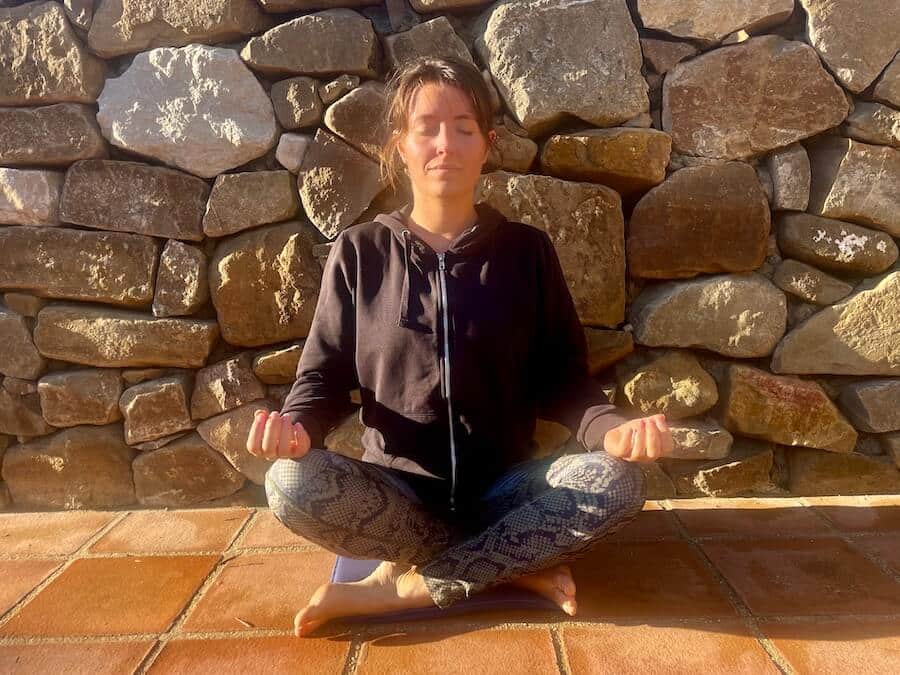Should you set a timer for meditation?
You know that nagging feeling that you might over shoot and be late for your important day . . . or the exact opposite – that maybe, without a timer you won’t meditate for long enough.
Maybe you’re meditating while travelling and are worried about missing your stop.
The answer to whether you should set a timer is both yes and no, depending. Sometimes it’s positive to meditate with a timer and other times it can be negative.
In this article we’ll explore some of the reasons to set a timer – and why you might not.
If you’re looking for a quick answer, here’s the abbreviated version, and for the full answer, keep scrolling.
Table of Contents
Short Answer: Should You Set a Timer for Meditation?
The concise answer is that it depends on the specific meditation session. Your goal is to forget about time altogether, so if that means setting a timer to help stop you from worrying about overshooting the amount of time you have available, then a timer is positive and can enhance the quality of your meditation. It’s also useful if you specifically want to be sure that you meditate for 30 minutes for example. But if you’re free to meditate for as long as you like, then the addition of a timer will pull your mind towards the time rather than inwards to the meditation, and a timer will then become a negative thing to dilute the impact of the meditation. Anticipating the timer and waiting for it to go off is another negative associated with setting a timer. And finally, if you do choose to use a timer, you don’t want to be abruptly pulled out of your meditation by a horrible alarm going off, so choose a timer with a suitable sound. So the bottom line is, use a timer with a soft sound if you’re feeling pressured for time or want to fulfil a specific time slot for your meditation, but consider practising meditating without a timer if you’re free to practise without any time pressure.
What’s the Purpose of Your Meditation Session?
If you’re new to meditating, or even if you’re feeling a bit discouraged (you can get the benefits of meditation even if you think you can’t), it can be easy to lose perspective on why you’re meditating.
Before diving into the question of whether you should set a timer for meditation or not, it’s worth considering what the reasons for your meditation are in the first place, and from there, dive into why you would set the timer or not.
Personally, I find it helpful to see my meditation session as my special ‘me‘ time, a treat and a relaxation from a busy day.
By doing this I set myself up for success before I even start because I’m not putting a load of pressure on the meditation session to produce miraculous results.
It’s a fact that meditation can improve our lives and help us to unleash our true potential.
But like so many other things, if we meditate in a pursuit of the results because we’ve heard how powerful it is rather than for the doing of it, then the results might become elusive or even vanish.
I mean it’s great to be aware of the benefits, but you need to spend time in the present moment before you cross the bridge and start receiving.
As a result we can lose our dedication to the practise, because we become despondent when we don’t see the results we were seeking.
In other words, if you do it for the doing of it, the results flow in naturally, and conversely, if you do something just for seeking the results, then you sabotage your own progress and the results fail to appear.
I’ve found this to be one of the best tips for seeking success.
We always succeed at what we immerse ourselves in and rarely succeed at something which we’re doing just to get a desired outcome (think dieting for example. If you diet to lose weight, all the lost kilos pile back on as soon as you stop. But if you find a sustainable lifestyle that you love doing, such as the whole foods plant based lifestyle, then your body sheds the kilos in natural timing and stays at its new place.)
So the conclusion is, you should always do whatever you do for the doing of it rather than just for the end gains. Only that way can you gain the success you seek.
Sure, you can set goals and push yourself harder, but if you don’t pay attention and enjoy the actual activity, then you’ll most likely push the success away from you. So what is the purpose of meditating apart from exploring the moment?
Well, there are loads of reasons for meditating, from reducing stress, rewiring the brain to cope better in difficult situations, rewiring the brain to raise the base level vibration to one of more joy, connecting to your higher self, finding stillness, reclaiming health and more.
Or you may be meditating to learn mindfulness skills on your own during your meditations.
And one of the most principal purposes is to become more aware of yourself and everything around you. It acts as a kind of awakening, which will also lead to tangible benefits in your daily life.
And one way to help deepen your progress is to try meditating in the dark.
Even if you think you can’t meditate because you don’t have a quiet place to go, you still can.
Meditating For Greater Awareness
One of the benefits of meditation is the increased awareness it brings.
As you become the observer of your thoughts, emotions and beliefs, so you become more aware of who you are and how you are choosing to react to your surroundings and circumstances.
Some people who have never meditated become completed identified with their thoughts. They think they ARE their thoughts. Meditation helps you to realise that you aren’t your thoughts and that you can choose to give your attention to the thoughts which best serve you.
During meditation you want to release yourself from your stressy, thinking mind. This doesn’t mean that your thoughts will stop flowing, but simply that you will stop engaging with them.
Of course sometimes you might catch yourself interacting with your thoughts, but that’s just normal. Don’t beat yourself up, just accept it and return your focus away from your thoughts.
As you meditate and a thought occurs, you gently bring your focus back to your breathing (depending what you decide to focus on while meditating), thus allowing the thoughts to pass without a long and drawn out internal dialogue.
This is a really important point when considering whether to meditate with a timer or not. Because the last thing you want to do when meditating is to focus on the time – or the timer.
When is it Beneficial to Set a Timer for Meditation?
If you have an appointment or have to be somewhere reasonably soon, inevitably you’re going to be worrying about the time, feeling anxious in case you overshoot your slot. To avoid that preoccupation, set a timer and then allow yourself to forget about the time.
Likewise, if you want to get used to meditating for a specific amount of time and you find yourself focussing on that rather than letting go, setting a timer might be a great solution for you. You can sit to meditate knowing that you’ll be complying with your allocated session as long as you continue to meditate until the timer goes off.
Another positive of setting a timer is when you want to train yourself to be able to gauge time without a timer. You might want to set a timer just as a training exercise to help you get better at feeling the time pass rather than timing it.
You can also play around with your meditation practise. Explore meditating with music or without. Challenge yourself by trying meditation with your eyes open and practise meditation with a timer and without.
Remember, when you use a timer, you don’t want to be shocked out of meditation by a loud beeping alarm going off! Instead, choose something which will bring you gently out of meditation.
There are many options for meditation timers, from apps for your phone to alarm clocks like this one in the review below.
When is it Not Beneficial to Set a Timer for Meditation?
When you set a timer for your meditation, it can swing two ways. Sure, it can free you from worrying about time because you know you’re not going to overshoot your allocated time slot, but it can also do the exact opposite.
When you set a timer you might find yourself subconsciously returning to the thought of ‘When is the timer going to go off’?‘ This can grow into a sensation of waiting for the timer, which will pull you out of the meditative state and reduce the quality of your meditation.
It can also turn your meditation into a chore if you’re not careful, as you feel that you have to sit until the alarms announces you’ve finished.
Personally, I like to sit without a timer as long as I know I have plenty of time. But if I’m worried about not having enough time, then the timer gives me peace of mind and I will set it for however long I have available.
Then I can get into the meditation without the nagging feeling that I’m going to be late for something.
But if I have enough time to spare, then I prefer to sit without the timer. And sometimes I set the stopwatch running so that when I’ve finished I can look at how long I meditated for, and that helps me to gauge the passing of time better from feeling rather than from the clock.
Pros of Setting a Timer for Meditation
- You can be sure that you spend the desired amount of time in meditation.
- The timer can be set for incrementally longer periods to extend your meditation sessions each time.
- The timer can help to train you to naturally feel a specific amount of time while in meditation. So for example, you meditate for 30 minutes with a timer set and then remove the timer once you’ve got used to sitting for that amount of time.
- If you’re short of time or you have to be somewhere soon after the meditation session, the timer will give you peace of mind so that you can leave your worries about the time at the door so to speak, and truly give your meditation 100%.
Cons of Setting a Timer for Meditation
- Setting a timer can make the meditation session feel like a chore or a burden (‘I have to sit until the timer goes off’) instead of thinking of it as a special time for yourself.
- A lot of people find themselves anticipating the timer and waiting for it to go off, or wondering ‘how long’ there is left before they can stop. This completely reduces the quality of the meditation.
- When you’re immersed in a deep meditation and suddenly a timer goes off, it can be quite a rude awakening. If you do use a timer, choose a gentle sound which won’t bring you out with a shock.
Conclusion: Should Set a Timer for Meditation?
One of the main objectives of meditation is to release your attachment to thoughts, so the use of a timer should be conducive to letting go and allowing your thoughts to flow without attachment to a particular worry, such as an impending appointment, or the anticipation of the timer going off.
Ultimately it isn’t just a personal question but also a circumstantial one. So I would recommend trying both ways and using the timer as a tool for releasing as well as removing the timer to encourage the freedom and release from its use.
Finally, if you’re wondering whether there’s a relationship between mindfulness and a vegan diet, I firmly believe that there is.
Eating a whole foods plant based diet improves the quality of your meditation, and likewise but in reverse, meditating can help to raise the awareness of your diet and help you choose healthier, more ethical food choices.








